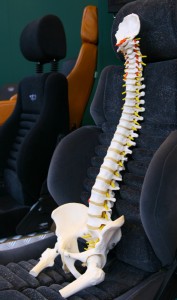← Gardening Hints and Tips Chiropractic and Neuralgia →
Does Driving Cause You Pain?
March 14, 2016

Why Driving Causes Back Pain
The mere act of sitting in a car seat can put strain on the back. This is because the seats do not usually allow for the lumbar curve in the spine. In fact, sitting upright in a car makes this curve non-existent, and it can put strain on the muscles and ligaments of the lower back. In addition, it can cause pressure on the discs of the lumbar region and lead to a herniation. Although many cars have decent suspension and shock absorbers, the spine is still jolted and vibrated with the passage of the car over the road.
The seat itself doesn’t help matters. Many cars have a low roof, and this means the seat is often sunk down into the car and tipped back to accommodate head room. Unfortunately, this position puts strain on the hamstrings which can pull the pelvis out of alignment. The awkward position causes strain in the lower back, hips, and legs. With the seat tipped back, the neck has to crane at least 20 degrees out of alignment to see ahead. This can cause pain in the neck, head, and upper back.
Ergonomics for Your Car
To help minimize these problems, it helps to adjust the seat. You should aim adjust your seat so that it provides as much support to the backs of the legs as possible. This will keep them from pulling the pelvis out of alignment. Sit with the seat a moderate distance from the pedals. If you sit too close, you may not be able to make adjustments as necessary. If you sit too far away, though, you will put strain on your lower back and neck as you strain to reach for the pedals. Aim for a comfortable distance that allows for a slight bend to the knee.
It is also important to adjust your steering wheel height. Many cars come with adjustable wheels and having it in the right position can take strain off your spine. Put your hands at 10 and 2 and adjust the wheel until there is a bend to your arms. Reaching out for a wheel that is too far away can strain your neck.
Lumbar support is the most important part of making your car back friendly. Some newer cars have built in lumbar support, but if yours does not, you can easily get a lumbar pillow for longer car rides. The pillow should gently press against the lower back at about waist height. You don’t want to have too much curvature to the lumbar region as this can cause strain, but not having any at all is just as bad. Find the pillow or setting that is gentle and comfortable for maximum benefit.
Preventing Pain Before It Starts
You can do a few things to prevent pain before it starts to be a problem. For instance, buy an automatic transmission vehicle over a manual because the constant use of the clutch can strain the lower back. Find a car that has built in and adjustable lumbar support for the maximum benefit to your back. Many newer cars have a great deal of options, and if you have a back problem, lumbar support seats may be worth it.
Of course, certain behaviors can also help with the pain. If long trips tend to make your back hurt, take the time to break the trip into smaller chunks. Drive for an hour and then get out and walk. Perhaps have another person drive for a while so that your back can rest. When you go on extended driving trips, you may be tempted to stretch and bend. This may cause problems with your muscles, ligaments, and discs because these structures are more tired and prone to injury after a long drive. Simple walking or sitting in a supportive chair for a while should help.
If you suffer from back or neck pain it’s always important to have your spine checked by a chiropractor.
This entry was posted in
General. Bookmark the
permalink.
← Gardening Hints and Tips Chiropractic and Neuralgia →


Leave a Reply
You must be logged in to post a comment.